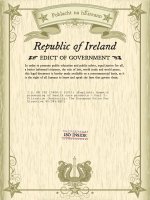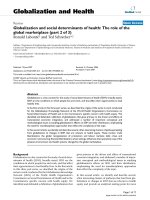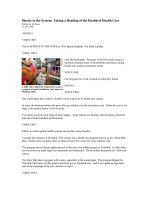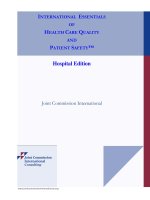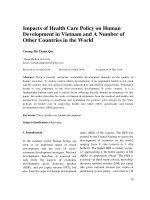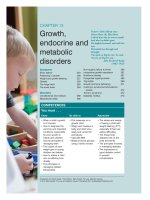Aseptic processing of health care products - Part 2: Filtration (ISO 13408 -2:2003)
Bạn đang xem bản rút gọn của tài liệu. Xem và tải ngay bản đầy đủ của tài liệu tại đây (841.17 KB, 30 trang )
In order to promote public education and public safety, equal justice for all,
a better informed citizenry, the rule of law, world trade and world peace,
this legal document is hereby made available on a noncommercial basis, as it
is the right of all humans to know and speak the laws that govern them.
Republic of Ireland
≠ EDICT OF GOVERNMENT ±
I.S. EN ISO 13408-2 (2011) (English): Aseptic
processing of health care products - Part 2:
Filtration [Authority: The European Union Per
Directive 90/385/EEC]Irish Standard
1.5.
EN
ISO
13408-2:2011
Aseptic processing of health care
products - Part
2:
Filtration
(ISO
13408
-2:2003)
©
NSAI
2011
No
copying
without
NSAI
permission except
as
permitted
by
copyright law.
1.5.
EN
ISO
13408-2:2011
Incorporating
amendments/corrigenda/National
Annexes issued since publication:
The National Standards
Authority
of
Ireland (NSAI) produces
the
following
categories
of
formal
documents:
I.S.
xxx: Irish Standard - national specification based on
the
consensus
of
an
expert
panel and
to
public
consultation.
S.R.
xxx:
panel and
Standard Recommendation -
recommendation
based on
the
consensus
of
an
expert
to
public
consultation.
SWiFT xxx: A rapidly developed
recommendatory
document
based on
the
consensus
of
the
partiCipants
of
an
NSAI
workshop.
This
document
replaces:
EN
13824:2004
This
document
is based on:
Published:
EN
ISO
13408-2:2011
5 July, 2011
EN
13824:2004 24 November, 2004
This
document
was published
ICS
number:
under
the
authority
of
the
NSAI
11.080.01
and comes
into
effect
on:
5 July, 2011
NSAI
T + 353
1807
3800 Sales:
1
Swift
Square,
F +353 1 807 3838 T
+35318576730
Northwood, Santry
E
F
+35318576729
Dublin 9
W standards.ie
W NSALie
Udaras urn Chaighdeain Naisiunta
na
hEireann
1.5.
EN
ISO 13408-2:2011
EUROPEAN
STANDARD
EN
ISO
13408
2
NORME
EUROPEENNE
EUROpAISCHE
NORM
ICS
11
.
080.01
June
2011
Supersedes
EN
13824:2004
English Version
Aseptic
processing
of
health
care
products
- Part
2:
Filtration
(ISO
13408-2:2003)
Traitement aseptique des produits de sante - Partie
2:
Filtration (ISO 13408-2:2003)
Aseptische Herstellung von Produkten
fUr
die
GesundheitsfOrsorge - Teil
2:
Filtration (ISO 13408-2:2003)
This European Standard was approved
by
CEN on 10 June 2011 .
CEN members are bound to comply with the CEN/CENELEC Internal Regulations which stipulate the conditions for giving this European
Standard the status
of
a national standard without any alteration. Up-to-date lists and bibliographical references concerning such national
standards may
be
obtained
on
application to the CEN-CENELEC Management Centre
or
to any CEN member.
This European Standard exists
in
three official versions (English, French, German). A version
in
any other language made by translation
under the responsibility
of
a CEN member into its own language and notified to the CEN-CENELEC Management Centre has the same
status as the official versions.
CEN members are the national standards bodies
of
Austria, Belgium, Bulgaria, Croatia, Cyprus, Czech Republic, Denmark, Estonia,
Finland, France, Germany, Greece, Hungary, Iceland, Ireland, Italy, Latvia, Lithuania, Luxembourg, Malta, Netherlands, Norway, Poland,
Portugal, Romania, Slovakia, Slovenia, Spain, Sweden, Switzerland and United Kingdom.
EUROPEAN COMMITTEE FOR ST ANDARDIZA TION
COMIrE
EUROPEEN
DE
NORMALlSA
nON
EUROpAISCHES
KOMIrEE
FOR
NORMUNG
Management Centre: Avenue Marnix 17, B-1000 Brussels
© 2011 CEN All rights
of
exploitation
in
any form and by any means reserved
worldwide for CEN national Members.
Ref. No.
EN
ISO 13408-2:2011: E
1.5.
EN
ISO 13408-2:2011
EN
ISO 13408-2:2011 (E)
Contents
Page
Foreword 3
Annex ZA
(informative) Relationship between
this
European Standard and the Essential
Requirements
of
EU
Directive 90/385/EEC on Active Implantable Medical Devices .4
Annex ZB (informative) Relationship between
this
European Standard and the Essential
Requirements
of
EU
Directive 93/42/EEC on Medical Devices 5
Annex
ZC
(informative) Relationship between
this
European Standard and the Essential
Requirements
of
EU
Directive 98/79/EC on in vitro
diagnostic
medical devices 6
2
I.S.
EN
ISO 13408-2:2011
EN
ISO 13408-2:2011 (E)
Foreword
The text
of
ISO 13408-2:2003 has been prepared
by
Technical Committee ISO/TC 198 "Sterilization
of
health
care products"
of
the International Organization for Standardization (ISO) and has been taken over as
EN
ISO 13408-2:2011 by Technical Committee CEN/TC 204 "Sterilization
of
medical devices" the secretariat
of which
is
held by BSI.
This European Standard shall
be
given the status of a national standard, either
by
publication of
an
identical
text or by endorsement, at the latest
by
December 2011, and conflicting national standards shall
be
withdrawn
at the latest by December 2011.
Attention
is
drawn to the possibility that some of the elements of this document may
be
the subject
of
patent
rights. CEN [and/or CENELEC] shall not
be
held responsible for identifying any or all such patent rights.
This document supersedes
EN
13824:2004.
This document has been prepared under a mandate given to CEI\! by the European Commission and the
European Free Trade Association, and supports essential requirements of
EU
Directives.
For relationship with
EU
Directives, see informative Annexes
lA,
lB,
or
lC,
which are integral parts of this
document.
According to the CEN/CENELEC Internal Regulations, the national standards organizations of the following
countries are bound to implement this European Standard: Austria, Belgium, Bulgaria, Croatia, Cyprus, Czech
Republic, Denmark, Estonia, Finland, France, Germany, Greece, Hungary, Iceland, Ireland, Italy, Latvia,
Lithuania, Luxembourg, Malta, Netherlands, Norway, Poland, Portugal, Romania, Slovakia, Slovenia, Spain,
Sweden, Switzerland and the United Kingdom.
Endorsement
notice
The text of ISO 13408-2:2003 has been approved by CEN as a
EN
ISO 13408-2:2011 without any
modification.
3
EN
ISO 13408-2:2011 (E)
loS.
EN
ISO 13408-2:2011
Annex ZA
(informative)
Relationship between this European Standard and the Essential
Requirements of
EU
Directive 90/385/EEC
on
Active Implantable Medical
Devices
This European Standard has been prepared under a mandate given to CEN
by
the European Commission
and
the European Free Trade Association to provide a means of conforming
to
Essential Requirements
of
the
New Approach Directive
90/385/EEC
on
active implantable medical devices.
Once this standard
is
cited
in
the Official Journal
of
the European Union under that Directive
and
has been
implemented
as
a national standard
in
at least one Member State, compliance with the clauses
of
this
standard given
in
Table
ZA.1
confers, within the limits
of
the scope
of
this standard, a presumption
of
conformity with the corresponding Essential Requirements
of
that Directive and associated EFTA regulations.
Table ZA.1 - Correspondence between this European Standard and Directive 90/385/EEC
Clauses
of
this EN
Essential Requirements (ERs) of Qualifying remarks/Notes
Directive 90/385/EEC
4,5,6,7,8,9,10,11,12 7
This relevant Essential Requirement is
only partly addressed
in
this European
Standard and only
in
conjunction with
EN
ISO 13408-1
WARNING - Other requirements and other
EU
Directives may be applicable to the product(s) falling
within the scope of this Standard.
4
I.S.
EN
ISO 13408-2:2011
EN
ISO 13408-2:2011 (E)
Annex
ZB
(informative)
Relationship between
this
European Standard and the Essential
Requirements
of
EU
Directive 93/42/EEC
on
Medical Devices
This European Standard has been prepared under a mandate given
to
CEN
by
the European Commission
and
the European Free Trade Association
to
provide a means
of
conforming
to
Essential Requirements of the
New Approach Directive
93/42/EEC
on
medical devices.
Once this standard
is
cited
in
the Official Journal of the European Union under that Directive and has been
implemented
as
a national standard
in
at least one Member State, compliance with the clauses
of
this
standard given
in
Table Z8.1 confers, within the limits of the scope
of
this standard, a presumption
of
conformity with the corresponding Essential Requirements of that Directive and associated EFTA regulations.
Table ZB.1 - Correspondence between
this
European Standard and Directive 93/42/EEC
Clauses
of
this
EN
Essential Requirements (ERs)
of
Qualifying remarks/Notes
Directive 93/42/EEC
4,5,6,7,8,9,10,11,12
8.3 This relevant Essential Requirement
is
only partly addressed
in
this European
Standard and only
in
conjunction with
EN
ISO 13408-1
4,5,6,7,8,9,10,11,12 8.4
This relevant Essential Requirement is
addressed
in
this European standard
only
in
conjunction with
EN
ISO 13408-1
WARNING - Other requirements and
other
EU
Directives may be applicable
to
the product(s) falling
within
the
scope
of
this
Standard.
5
EN
ISO 13408-2:2011 (E)
I.S.
EN
ISO 13408-2:2011
Annex
ZC
(informative)
Relationship between
this
European Standard and
the
Essential
Requirements
of
EU
Directive 98/79/EC on
in
vitro
diagnostic
medical
devices
This European Standard has been prepared under a mandate given
to
CEN
by
the European Commission
and
the European Free Trade Association
to
provide a means
of
conforming
to
Essential Requirements
of
the
New Approach Directive
98/79/EC
on
in
vitro diagnostic medical devices.
Once this standard
is
cited
in
the Official Journal of the European Union under that Directive and has been
implemented
as
a national standard
in
at least one Member State, compliance with the clauses of this
standard given
in
Table
ZC.1
confers, within the limits of the scope
of
this standard, a presumption
of
conformity with the corresponding Essential Requirements of that Directive and associated EFTA regulations.
Table
ZC.1
- Correspondence between
this
European Standard and Directive 98/79/EC
Clauses
of
this
EN
Essential Requirements (ERs)
of
Qualifying remarks/Notes
Directive 98/79/EC
4,5,6,7,8,9,10,11,12
B.2.3
This relevant Essential Requirement
is
only partly addressed
in
this European
Standard and only
in
conjunction with
EN
ISO 13408-1
4,5,6,7,8,9,10,11,12
8.2.4
This relevant Essential Requirement
is
addressed
in
this European standard
only
in
conjunction with
EN
ISO 13408-1
WARNING Other requirements and
other
EU
Directives may be applicable
to
the product(s) falling
within
the scope
of
this
Standard.
6
1.5.
EN
ISO 13408-2:2011
INTERNATIONAL
STANDARD
ISO
13408-2
First edition
2003-03-15
Aseptic processing
of
health care
products -
Part
2:
Filtration
Traitement aseptique des produits de sante -
Partie
2: Filtration
-~
~
SO]
-
~
-
- -
- -
-
- -
Reference number
ISO 13408-2:2003(E)
© ISO 2003
I.S.
EN
ISO 13408·2:2011
ISO
13408~2:2003(E)
PDF disclaimer
This PDF file may contain embedded typefaces.
In
accordance with Adobe's licensing policy, this file may
be
printed or viewed but
shall not
be
edited unless the typefaces which are embedded are licensed
to
and
installed
on
the computer performing the editing.
In
downloading this file, parties accept therein the responsibility
of
not infringing Adobe's licensing policy. The ISO Central Secretariat
accepts no liability
in
this area.
Adobe
is
a trademark
of
Adobe Systems Incorporated.
Details of the software products used
to
create this PDF file can
be
found
in
the General Info relative to the file; the PDF-creation
parameters were optimized for printing. Every care has been taken
to
ensure that the file
is
suitable for use
by
ISO member bodies.
In
the unlikely event that a problem relating to it
is
found, please inform the Central Secretariat at the address given below.
© ISO 2003
All rights reserved. Unless otherwise specified,
no
part of this publication may be reproduced or utilized
in
any form
or
by
any means,
electronic or mechanical, including photocopying and microfilm, without permission
in
writing from either ISO at the address below or
ISO's member body
in
the country
of
the requester.
ISO copyright office
Case postale
56.
CH-1211 Geneva 20
Tel.
+
41
2274901
11
Fax +
41
227490947
Web www.iso.org
Published
in
Switzerland
© ISO 2003 - All rights reserved
1.5.
EN
ISO 13408-2:2011
ISO 1340B-2:2003(E)
Contents
Page
Foreword iv
Introduction v
1 Scope 1
2 Normative references 1
3 Terms and definitions 1
4 General requirements 3
5 Selection
of
filters and
filter
assemblies based on
filter
manufacturer's data 3
6 Fluid-specific selection criteria based on filter user's data 3
7 Filtration process 4
7.1
Process parameters 4
7.2 Validation
of
fluid-specific microbial retention by filters 5
8 Filtration system design 7
9 Routine process 8
10
Process documentation 8
11
Maintenance and change
control
9
12
Operator training 9
Annex A (informative) Basic information and quality certificates
for
filter cartridges 10
Bibliography
11
© ISO 2003 - All rights reserved
iii
1.5.
EN ISO 13408-2:2011
ISO 1340B-2:2003(E)
Foreword
ISO (the International Organization for Standardization) is a worldwide federation
of
national standards bodies
(ISO
member
bodies). The work
of
preparing International Standards is normally carried out through ISO
technical committees. Each
member
body interested
in
a subject for which a technical committee has been
established has the right to be represented on that committee. International organizations, governmental and
non-governmental, in liaison with ISO, also take part
in
the work. ISO collaborates closely with the
International Electrotechnical Commission (IEC) on all matters
of
electrotechnical standardization.
International Standards are drafted
in
accordance with the rules given
in
the ISOIIEC Directives, Part 2.
Tile
main task
of
technical committees
is
to prepare International Standards. Draft International Standards
adopted by the technical committees are circulated to the
member
bodies for voting. Publication as an
International Standard requires approval by at least
75 %
of
the
member
bodies casting a vote.
Attention is drawn to the possibility that some
of
the elements
of
this
document
may be the subject
of
patent
rights. ISO shall not
be
held responsible for identifying any
or
all such patent rights.
ISO 13408-2 was prepared by Technical Committee ISOITC 198, Sterilization
of
health care products.
ISO 13408 consists
of
the following parts, under the general title Aseptic processing
of
health care products:
PaIt
1.'
General requirements
PaIt
2: Filtration
The following parts are under preparation:
PaIt
3: Freeze-drying
PaIt4:
Sterilization in place
PaIt
5: Cleaning in place
PaIt
6:
Isolator/barrier technology
iv
©
ISO
2003
-
All
rig
hts
reserved
1.5.
EN
ISO 13408-2:2011
ISO 13408-2:2003(E)
Introduction
During the process
of
preparing ISO 13408-1: 1998, which addresses general requirements, several items, e.g.
filtration, freeze-drying and steam-in-place, were found to
be
in
need of supplementary information which was
too large to
be
given
in
corresponding Annexes. This part of ISO 13408 includes requirements and guidance
that are to
be
observed when aseptically manufacturing health care products by filtration.
ISO 13408-1:1998 will
be
revised soon after the publication of this part
of
ISO 13408, as clause 20 of
ISO 13408-1:1998
is
replaced
by
this part of ISO 13408.
© ISO 2003
All
rights reserved
v
loS.
EN ISO 13408·2:2011
I.S. EN ISO 13408-2:2011
INTERNATIONAL STANDARD
ISO 13408-2:2003(E)
Aseptic
processing
of
health care
products
-
Part
2:
Filtration
1 Scope
This part
of
ISO 13408 specifies requirements for sterilizing filtration as part
of
aseptic processing
of
health
care products. It also offers guidance to filter users concerning general requirements for set-up, validation and
routine operation
of
a sterilizing filtration process, to be used for aseptic processing
of
health care products.
This part
of
ISO 13408 is not applicable to removal of viruses. Sterilizing filtration
is
not applicable to fluids
containing particles as effective ingredient larger than the pore size
of
a filter (e.g. bacterial whole-cell
vaccines).
2 Normative references
The following referenced documents are indispensable for the application
of
this document. For dated
references, only the edition cited applies. For undated references, the latest edition
of
the referenced
document (including any amendments) applies.
ISO 13408-1: 1998,
Aseptic processing
of
health care products Part
1:
General requirements
ISOITS
11139:2001, Sterilization
of
health care products - Vocabulary
3 Terms and definitions
For the purposes
of
this document, the terms and definitions given
in
ISO 13408-1, ISOITS 11139 and the
following apply.
3.1
bacterial challenge test
test to evaluate the capability
of
a filter to retain organisms from a bacterial suspension under defined
conditions
3.2
bioburden
population
of
viable microorganisms
in
a fluid prior to sterilizing filtration
NOTE
For the purposes of this part of ISO 13408, the definition of bioburden
is
narrower than that
in
ISOITS 11139.
3.3
chemical
compatibility
ability
of
the process fluids not to adversely affect the properties of filter materials andlor filter assembly
components and vice versa
3.4
fibre
particle having an aspect (Iength-to-width) ratio
of
10
or
more
[ISO 14644-1:1999, 2.2.7]
©
ISO
2003
-
All
rights
reserved
1
1.5.
EN
ISO 13408-2:2011
ISO 13408-2:2003(E)
3.5
fibre-releasing
filter
filter which, even after any appropriate treatment such as washing or flushing, will release fibres into the
filtrate
3.6
filter
porous material through which a liquid or a gas
is
passed to remove viable and non-viable particles
3.7
'filter assembly
filter cartridge(s) or filter material installed into a housing or holder
NOTE This can
be
done
by
the filter user or
by
the filter manufacturer, e.g.
in
the form of pre-assembled filter units.
3.8
filter
cartridge
filter material assembled into a unit
3.9
filter
equipment
gauge, valve and other items attached to
'Filter
assembly
3.10
filtration
process to remove viable and/or non-viable particles from liquids and/or gases
by
passage through a porous
material
3.11
filtration
system
filter assembly equipped with filter equipment
cf.
filter
equipment
(3.9)
3.12
fluid
liquid or a gas
NOTE The fluid subjected to the filtration process may
be
the formulation
to
be
produced, or a part
of
the formulation,
or a process fluid.
3.13
fluid-sterilizing
filter
filter that
is
capable of removing a defined challenge of microorganisms from a fluid under defined filtration
process conditions
NOTE Typically, such a filter has a nominal pore size rating
of
less than or equal
to
0,22
IJm.
3.14
integrity
test
non-destructive physical test which can be correlated to the bacterial retention capability of a filter/filter
assembly
3.15
microorganism
entity, encompassing bacteria, fungi, protozoa and viruses
NOTE For the purposes
of
this part
of
ISO 13408, viruses are not addressed.
2 ©
ISO
2003
-
All
rights
reserved
1.5.
EN
ISO 13408-2:2011
ISO 13408-2:2003(E)
3.16
nominal pore size rating
pore size of a filter as claimed
and
stated
by
the filter manufacturer
3.17
worst
case
most challenging pre-determined condition(s) and specification(s) applied
in
a process
to
be
validated
4 General requirements
The requirements of ISO 13408-1.1998 shall apply.
5 Selection
of
filters and
filter
assemblies based on
filter
manufacturer's data
5.1 Selection shall document the choice
of
the most suitable type(s)
of
filter, taking into account the
chemical
and
physical cl1aracteristics
of
the filters as established
by
the filter manufacturers.
NOTE For further information see A.1.
5.2 The filters selected shall have a quality certificate.
NOTE For further information see A.2.
5.3 Filters shall not contain asbestos
and
shall not
be
fibre-releasing. Where the
use
of fibre-releasing filters
is dictated
by
product need, it shall
be
demonstrated that the fibres are removed downstream of filtration.
6 Fluid-specific selection criteria based
on
filter user's data
6.1
The filter user shall evaluate filter characteristics following a documented filter evaluation programme
that takes into account the fluid to
be
filtered and the process used for filtration. Filter characteristics shall not
be
adversely affected
by
the fluid
to
be
filtered; conversely, the product shall not
be
adversely affected
by
the
filter. Adsorption of fluid components
and
extraction
of
filter components shall
be
evaluated.
6.2 For filter characterization, the following shall
be
taken into account:
a)
compatibility between filter
and
fluid;
1) effects of the formulation
and
process conditions
on
the chemical
and
physical attributes
and
performance of the filter;
2)
effects of the filter
on
the relevant biological, chemical
and
physical attributes of the product;
b)
process characteristics;
1) effective filter surface area required;
2)
pre-filtration requirements for reduction of particulate matter
and
reduction
of
bioburden.
Compatibility and process criteria, as applicable, should also
be
applied to pre-filters
in
view of their intended
use.
©
ISO
2003
-
All
rights
reserved
3
1.5.
EN
ISO 13408·2:2011
ISO 1340B-2:2003(E)
7 Filtration process
7.1
Process parameters
7.1.1 Process parameters shall be established, qualified and documented, and the process validated by the
filter user. Factors to be defined or specified include:
a) flushing procedures, including filter(s) and downstream flow path (or justification for lack
of
flushing);
The flushing process applied should ensure that the filtrate meets acceptable limits for extractables,
insoluble particles and oxidizable substances.
NOTE 1 Information from the filter manufacturer can
be
useful
in
designing and validating a flushing procedure.
NOTE 2 Results from a permanganate reduction test and/or total organic carbon (TOC) test can
be
useful
in
designing
and
validating a flushing procedure.
b)
sterilization procedures for the filter assembly, filtration system and fluid path, including the permissible
limit for cumulative sterilization time and/or number
of
cycles at applicable sterilization conditions
in
case
of
multiple sterilizations and re-use;
c)
filtration process conditions;
1 )
fluid pre-filtration holding time and effect
on
bioburden;
2) filter conditioning, with fluid if necessary;
3)
filtration time/total time filter is
in
contact with fluid;
4)
maximum number
of
repeated filtrations;
5) flowrate;
6) filtration volume;
7)
temperature;
8) differential pressure;
d) cleaning procedures for the filtration system.
7.1.2 Written integrity test procedures shall be established, including acceptance criteria and methods
of
failure investigation and conditions under which the filter integrity test can be repeated.
It should
be
demonstrated that the integrity test procedure(s) can be supported by bacterial-retention testing.
The standardized bacterial-retention tests should use a challenge level
of
at least 10
7
colony-forming units per
square centimetre
of
effective filtration area, with filters representative of standard production filters as close
as possible to the minimum integrity test specification.
NOTE Information from the filter manufacturer can
be
useful
in
designing
and
validating integrity test procedure(s)
based
on
gas flow through a wetted filter.
7.1.3 One
or
more appropriate wetting fluids shall be selected. These shall be the filter manufacturer's
recommended reference wetting fluid or the fluid to
be
filtered.
In
the latter case, the appropriate integrity test
value specification shall
be
established and validated. The wetting fluid shall be compatible with, and shall not
impart impurities
to,
the fluid to be filtered or the filter assembly.
7.1.4 For air and gas filters, an appropriate frequency for physical integrity testing shall be established.
4 © ISO 2003 - All rights reserved
I.S.
EN
ISO 13408-2:2011
ISO 1340B-2:2003(E)
7.2
Validation
of
fluid-specific microbial retention by filters
7.2.1 Bacterial
challenge
test
7.2.1.1 Fluid-sterilizing filtration shall
be
validated during initial process qualification
by
an
appropriate
bacterial challenge test using at least one filter from not less than three lots of filters with three consecutive
slJccessful outcomes. All failures shall
be
investigated.
NOTE 1 This testing
is
usually performed
in
a scaled-down model system (which can include a different cartridge or
disc size)
in
a laboratory environment to avoid jeopardizing the quality of the manufacturing environment.
NOTE 2
In
case of
an
unsuccessful validation test, any further course of action depends
on
the outcome of the failure
investigation.
7.2.1.2 Bacterial-retention performance of filters shall
be
validated
in
a fluid-specific manner or for fluid
groups under worst-case conditions. Justification for grouping fluids for validation shall
be
by
a documented
rationale.
7.2.1.3 For fluid-specific bacterial challenge testing, membranes of the same type as that used for
production shall
be
obtained from the filter manufacturer and shall have been found to
be
close to the limit of
acceptance
in
filter integrity testing (typically within
10
% of the limit).
7.2.1.4 For the selection
of
the challenge conditions to simulate worst-case conditions
in
production, the
following shall
be
taken into account:
a) pH;
b)
viscosity;
c)
ionic strength;
d)
osmolarity;
e)
concentration of active ingredient and/or excipients;
f)
su
rface activity/tension;
g)
effect of fluid
on
challenge organisms;
h)
characteristics of process bioburden;
i)
filtration time/total time filter
is
in
contact with fluid;
j) filtration volume per unit area of filter;
k)
flowrate/flux across the filter;
I)
differential pressure;
m)
temperature;
n)
sterilization conditions;
0) effect of repeated sterilizations where relevant.
7.2.1.5 Revalidation shall
be
performed whenever filters or filtration conditions are altered to
be
outside
the worst-case conditions tested during validation.
©
ISO
2003
-
All
rights
reserved
5
1.5.
EN
ISO 13408-2:2011
ISO 13408-2:2003(E)
7.2.2 Challenge
fluid
and challenge
microorganisms
7.2.2.1 The testing fluid shall
be
the fluid
to
be
filtered. If the fluid
to
be
filtered cannot
be
used due
to
antimicrobial or other properties, a simulation fluid or a change
in
simulation conditions shall
be
used.
In
determining the simulation, the following shall
be
considered:
a)
modifying the fluid
to
be
filtered (e.g. reducing or eliminating the antimicrobial compound);
The simulation fluid shall mimic as closely
as
possible the formulation
and
the following fluid specific
characteristics:
pH,
viscosity, ionic strength, osmolarity, surface activity/tension,
and
the effects of the
fluid
on
the challenge organisms.
b)
reducing fluid-organism exposure time;
c)
reducing the fluid temperature;
d)
using a diminutive organism that
is
resistant to the antimicrobial properties
of
the fluid or process;
e)
exposing the filter
to
the fluid with the anticipated fluid contact time, followed
by
a challenge
in
a
modification of fluid as
in
a)
to
d)
above.
7.2.2.2 Unless a rationale for a lower challenge level
is
given,
an
acceptable challenge level
of
Brevundimonas diminuta (e.g. ATCC 19146 or DSM 1635) is at least 10
7
colony-forming units per square
centimetre
of
effective filter surface area.
If there
is
concern that there may
be
more penetrating microorganisms than Brevundimonas diminuta,
an
appropriate microorganism should
be
considered for use.
NOTE Factors of potential concern can
be:
presence of biological material;
use of water from systems that are not operated under self-sanitizing conditions;
presence of microorganisms known to penetrate filters;
presence of pleomorphic organisms
(e.
g.
L forms
in
penicillin solution, mycoplasma).
Where it
is
not possible to use Brevundimonas diminuta
and
where
no
more penetrating microorganisms have
been identified as potential challenge organisms, the user shall justify the choice
of
an
alternative challenge
microorganism.
Where alternative organisms are cultivated as challenge organisms, cultivation conditions shall
be
chosen
appropriately to yield cells of a small size (see [2] and [3]).
7.2.2.3
Validation of the microbial aspects
of
the challenge test shall ensure that
a)
the challenge organisms are dispersed
in
a volume
of
the fluid representative for batch size
and
available
filter area, unless antimicrobial properties require a different approach;
b)
the viable count of the challenge suspension during the test is determined
on
an appropriate number
of
samples taken throughout that time
to
show that the intended challenge
is
actually delivered and that the
challenge remains viable for the duration
of
the test;
c)
the challenge
is
recoverable from the filtrate if present;
d)
the test method
is
capable
of
recovering a small number of challenge organisms from the filtrate.
6 © ISO 2003 - All rights reserved
1.5.
EN
ISO 13408-2:2011
ISO 13408-2:2003(E)
7.2.3 Acceptance criteria
Acceptance criteria: no growth of the challenge organism
in
the filtrate following a microbial challenge.
8 Filtration system design
8.1
The selection of components for the filtration system (including air and gas filters),
and
their
interconnection and arrangement within the filtration system, shall
be
documented and justified.
8.2 The filtration system shall not impart objectionable impurities
to
or otherwise alter the quality
of
the fluid.
Such components can include:
a)
piping systems and connections;
b)
valves;
c)
gauges and/or other instruments;
d) gaskets, O-rings and/or packings;
e)
'filter materials (see A.1).
8.3
In
air and gas filtration, attention should
be
paid
to
avoidance of unintended moistening or wetting
of
the
filter or filter equipment.
8.4 Filtration system design shall allow operation within validated process parameters.
8.5 The system shall
be
designed to maintain the sterility
of
the filtrate. Environmental conditions shall
be
defined. See ISO 13408-1: 1998, Clause
14.
8.6 The filtration system shall
be
designed
so
that the number
of
aseptic connections is minimized.
8.7 A sterilizing filter should
be
installed as close as possible to the point
of
fill.
8.8 The filtration system shall
be
designed
to
allow cleaning procedures to
be
conducted as necessary.
8.9 The filtration system shall
be
designed
to
allow sterilization procedures to
be
conducted as necessary.
The sterilization procedures shall
be
validated to a sterilization assurance level (SAL) of not less than
10-
6
.
NOTE Acceptable approaches
to
sterilization
can
include:
sterilization
in
place;
sterilization of disassembled components followed
by
aseptic assembly.
8.10 The filtration system should
be
designed
to
permit in-place integrity testing
as
a closed system prior to
filtration.
Care should
be
taken not
to
compromise the sterility
of
the filter.
©
ISO
2003
-
All
rights
reserved
7
1.5.
EN
ISO
13408-2:2011
ISO 1340B-2:2003(E)
9 Routine process
9.1
The routine process for filtration shall
be
documented
in
a written procedure.
9.2 The written procedures shall include processing requirements
for:
a)
inspection of components;
b)
assembly of the filtration system;
c)
cleaning, sterilization or flushing;
d)
time between cleaning
and
sterilization;
e)
time between sterilization and use;
f)
control testing including integrity test testing;
g)
monitoring of parameters such as temperature, differential pressure, flowrate, etc.
9.3 Pre-sterilization bioburden shall
be
determined for every batch, unless
all
aspects
of
aseptic
manufacture are well controlled and previous test results have shown bioburden
to
be
low and consistent.
9.4 Procedures shall be
in
place
to
minimize the number
of
microorganisms prior
to
sterile filtration, thus
minimizing the challenge
to
the sterilizing filter.
9.5 The validated physical integrity test of a sterilizing filter shall
be
conducted after each use without
disturbing the filter
in
its housing. Physical integrity testing of a sterilizing filter
in
situ should
be
conducted
before use after sterilization where the design of the filtration system permits.
Care should
be
taken not
to
compromise the sterility
of
the filter.
10
Process documentation
10.1 All critical defined process parameters shall
be
documented and maintained
in
a report. The
documentation shall become part
of
a batch record.
10.2 Batch manufacturing records shall include, where appropriate:
a)
dates of fluid preparation and filtration;
b)
name and batch number of the fluid;
c) operator's name(s);
d)
filter manufacturer, filter type
and
filter manufacturer's lot and/or serial number(s);
e)
cleaning of filtration system;
f)
sterilization conditions for the filtration system;
g)
filtration process conditions (differential pressure, upstream pressure, downstream pressure, flowrate,
operation temperature, time, etc.);
h)
filter integrity test result and assessment;
i)
reference
to
sterilization cycles used for components employed
in
the filtration process;
j) any deviations
to
the written procedure that have occurred.
B © ISO 2003 - All rights reserved
1.8. EN ISO 13408-2:2011
ISO 13408-2:2003(E)
11
Maintenance and change control
11.1 The filter user shall establish, document and execute calibration and maintenance procedures for the
filter and filtration system
and
test instruments. A change-control procedure shall
be
defined and documented
for any change of the defined process parameters.
11.2 Any change
in
filter manufacturing conditions as reported
by
the filter manufacturer shall
be
evaluated
with respect
to
their potential effect
to
the defined product and process parameters. See
7.1.1
c)
and
7.2.1.4.
11.3 There shall
be
a written agreement between the filter user and filter manufacturer that they will comply
with this requirement. This should
be
verified
by
the filter user through audits
of
the filter manufacturer.
12 Operator training
Filtration-specific operator training shall be implemented and documented,
for:
a)
basic filtration procedures, modes
of
failure and needed precautions;
b)
integrity test theory;
c) failure investigation procedures and measures taken
in
case
of
integrity test deviations;
d)
filter assembly procedure (including aseptic technique if required);
e)
filter installation, cleaning and sterilization procedures.
©
ISO
2003
-
All
rights
reserved
9
